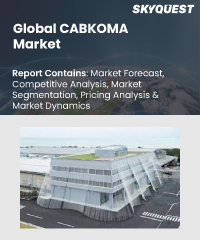
Report ID: SQMIG15E2205

Report ID:
SQMIG15E2205 |
Region:
Global |
Published Date: March, 2024
Pages:
184
|
Tables:
61 |
Figures:
75
CABKOMA Market Drivers
Increasing Demand for Lightweight and High-performance Materials
One driver of the CABKOMA market is the increasing demand for lightweight and high-performance materials in the aerospace and automotive industries. CABKOMA offers high strength-to-weight ratios, making it ideal for these industries to improve fuel efficiency, reduce emissions and enhance performance. The rising demand for commercial air travel and the growing number of aircraft deliveries worldwide, as well as the increasing demand for electric and hybrid vehicles, which require lightweight materials for battery and motor components, are expected to drive the demand for CABKOMA in the market.
Increasing expansion of the aerospace and defence sectors
One of the key growth drivers for the Carbon Thermoplastic Composites Market is the expanding aerospace and defence sectors globally. Additionally, the International Civil Aviation Organisation is working to lessen the aviation sector's influence on the environment, which is boosting the adoption of aircraft emission regulations for new aircraft. As a result, market growth increases during the research period.Additionally, the expanding aircraft manufacturing in various developing nations like China and India is driving up demand for carbon thermoplastic composites at a significant rate during the assessment timeframe.
CABKOMA Market Restraints
High Cost of Production and Limited Availability of Raw Materials
Our industry expert will work with you to provide you with customized data in a short amount of time.
REQUEST FREE CUSTOMIZATIONWant to customize this report? This report can be personalized according to your needs. Our analysts and industry experts will work directly with you to understand your requirements and provide you with customized data in a short amount of time. We offer $1000 worth of FREE customization at the time of purchase.

Report ID: SQMIG15E2205